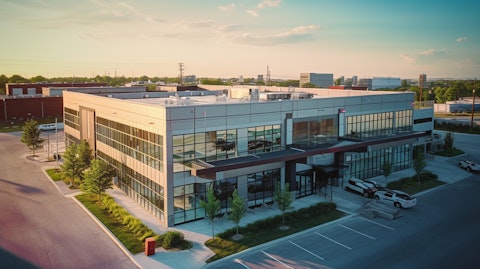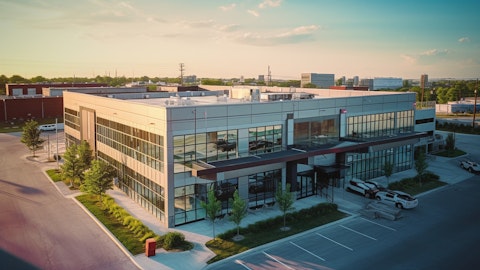LXP Industrial Trust (NYSE:LXP) Q1 2024 Earnings Call Transcript May 2, 2024
LXP Industrial Trust misses on earnings expectations. Reported EPS is $0.04 EPS, expectations were $0.16. LXP Industrial Trust isn’t one of the 30 most popular stocks among hedge funds at the end of the third quarter (see the details here).
Operator: Good morning, my name is Dennis, and I will be your conference operator today. At this time, I would like to welcome everyone to the LXP Industrial Trust First Quarter 2024 Earnings Call and Webcast. All lines have been placed on mute to prevent any background noise. After the speakers remarks there will be a question and answer session. [Operator Instructions]. I would now like to hand today’s call over to Heather Gentry, Investor Relations. Please go ahead.
Heather Gentry: Thank you, operator. Welcome to LXP Industrial Trust first quarter 2024 earnings conference call and webcast. The earnings release was distributed this morning and both the release and quarterly supplemental are available on our website in the Investors section and will be furnished to the SEC on a Form 8-K. Certain statements made during this conference call regarding future events and expected results may constitute forward-looking statements within the meaning of the Private Securities Litigation Reform Act of 1995. LXP believes that these statements are based on reasonable assumptions. However, certain factors and risks, including those included in today’s earnings press release and those described in reports that LXP files with the SEC from time-to-time, could cause LXP’s actual results to differ materially, from those expressed or implied by such statements.
Except as required by law, LXP does not undertake a duty to update any forward-looking statements. In the earnings press release and quarterly supplemental disclosure package, LXP has reconciled all non-GAAP financial measures to the most directly comparable GAAP measure. Any references in these documents to adjusted company FFO refer to adjusted company funds from operations available to all equity holders and unitholders on a fully diluted basis. Operating performance measures of an individual investment are not intended to be viewed as presenting a numerical measure of LXP’s historical or future financial performance, financial position or cash flows. On today’s call, Will Eglin, Chairman and CEO; Beth Boulerice, CFO; Brendan Mullinix, CIO; and Executive Vice President, James Dudley, will provide a recent business update and commentary on first quarter results.
I will now turn the call over to Will.
Will Eglin: Thanks, Heather. Good morning everyone. First quarter results were consistent with our expectations and we continue to focus our efforts on development leasing, marking rents to market and capitalizing on build-to-suit investment opportunities, while we manage towards lower leverage. After a slow start to the year, we leased approximately 1.6 million square feet after quarter end and we anticipate continued strong second quarter volume with active lease renewal negotiations in process on approximately 1.4 million square feet. In addition, we are responding to RFPs for further negotiation on approximately 1.3 million square feet in our development pipeline. This activity is promising, although there is no guarantee that any leases will be executed.
Renewals continue to take longer to negotiate, partly due to the continued uncertainty in the macroeconomic environment and the disconnect between market rents versus tenants perspectives on their bargaining power. Overall, we believe that, we are in a position of negotiating strength due to our high quality Class A properties that feature modern specs, including high clear height, ample dock doors and auto and trailer parking spots and easy access to highways, airports and ports, all of which make our assets among the most desirable in our target market. As a result of second quarter leasing, we now expect our 2024 same-store NOI will be in the range of 4% to 5%, an increase from our previous range of 3.5% to 4.5%. On another positive note, our average annual escalators increased to 2.7% in the quarter, up from 2.6%.
In addition to these contractual escalators future earnings growth is supported by our estimates of below-market rents through 2029 in our portfolio and the stabilization of our remaining spec development pipeline. Based on our current estimates of below-market rents, as of quarter end these mark-to-market outcomes are estimated to increase initial cash rent by $36 million or $0.12 per share through 2029, while stabilization of the development pipeline is estimated to produce initial cash rent of $20 million or $0.07 per share, as the developments lease up. On the investment side, during the quarter, we committed to an approximately 625,000 square foot build-to-suit project in Greenville-Spartanburg. This investment provides us the opportunity to recycle capital into a newly constructed asset in one of our target markets on accretive terms.
The build-to-suit market is our main area of focus and we will continue to pursue and act on growth opportunities that fit our investment criteria. Moving to the balance sheet. We have good liquidity and have effectively extended our maturities out to 2027. We ended the quarter at 6.1 times net debt to adjusted EBITDA and we are focused on moving towards the low end of our target leverage range of 5 times to 6 times, which will be driven by occupancy gains in our development pipeline and rent growth. With that, I’ll turn the call over to Brendan to discuss investment activity in more detail.

Brendan Mullinix: Thanks, Will. We invested approximately $25 million in the first quarter in development, with approximately $35 million left to fund in our remaining spec development projects, excluding any partner promotes and $65 million in a build-to-suit project. We placed our approximately 488,000 square foot, previously leased Phoenix facility into service during the quarter. The facility was leased for seven years with 4% average annual escalations at a starting rent of $9.60 per square foot and an estimated stabilized cash yield of 8.3%, excluding partner promote. We also completed the base building construction of our 250,000 square foot Columbus development project in January. We are currently in lease negotiations on approximately 60,000 square feet of the facility and are responding to tenant interest for the balance of the building.
On the investment side, with build-to-suit projects our primary focus, we are reviewing a number of projects in our target markets, including inquiries involving our Phoenix Land Bank. As Will mentioned, we committed to a build-to-suit project for an international auto parts manufacturer during the quarter on 59 acres in the Greenville-Spartanburg market for initial purchase price of approximately $74 million at an estimated cash capitalization rate of 7.04%. The approximately 625,000 square foot cross dock warehouse distribution facility will be built to modern specs including 40 foot clear height. The facility can also be expanded by 174,000 square foot. We expect the project to complete based in the fourth quarter or first quarter or 2025.
The initial lease term of 12 years with 3% annual escalators will commence at project completion. We expect capital needs for the project and any future build-to-suit projects to be funded with capital recycling proceeds, including our share of the $87 million of potential proceeds, we are estimated to receive in the event the data center user that previously leased the 100 acre Phoenix land parcel exercises their option to purchase the land in the fourth quarter. With that, I’ll turn the call over to James to discuss leasing.
James Dudley: Thanks, Brendan. Leasing volume was slow in the first quarter marrying the market dynamics currently taking place across the country. Nationally, the average vacancy rate was up quarter-over-quarter with net absorption significantly down. Rents in our target markets continue to be higher than they were a year ago, but flat quarter-over-quarter. That said, the continuing decrease in new spec construction starts should help with the supply demand imbalance over time. We are also encouraged by the commentary across our markets that activity feels better, as inquiries and tours pick up. In the first quarter, we finalized a three year extension with 4% annual rental bumps for approximately 120,000 square foot at a 396,000 square foot facility in the Atlanta market with a cash rental increase of approximately 28%.
The remainder of the facility is currently leased through 2031. We had two notable leasing outcomes in the Memphis market after quarter end. This included a five year extension with 3% annual bumps at our approximately 928,000 square foot facility at a cash rental increase of approximately 30%. Additionally, we executed a five year renewal with 3.5% bumps at our 700,000 square foot facility for an estimated cash rental increase of approximately 25%. A portion of our remaining 2024 expirations and several of our 2025 lease expirations are included in the additional 1.4 million square feet currently in negotiations. We still expect our remaining 2024 expirations to produce a 20% to 30% cash rental increase, based on our current market conditions.
Our industrial stabilized portfolio was 95.5% leased at quarter end. The change versus the previous quarter is primarily attributable to approximately 2.1 million square feet of non-leased industrial development entering the stabilized portfolio pool. With that, I’ll turn the call over to Beth to discuss financial results.
Beth Boulerice: Thanks, James. First quarter revenue was $86 million with property operating expenses of about $15 million of which 93% was attributable to tenant reimbursement. We have produced adjusted company FFO of $0.16 per diluted common share or approximately $49 million in the first quarter. G&A was $9.5 million in the first quarter. We have been focused on operating efficiencies, including shrinking our footprint in New York as we transition overhead costs to our Florida and Dallas offices. During the quarter, we subleased our approximately 20,000 square foot Penn One office space through March 2026. We expect rent expense to decline initially by approximately $600,000 annually and by roughly $1 million annually after March 2026.
We now anticipate 2024 G&A will be within a range of $36.5 million to $38.5 million. Our same-store industrial portfolio was 99.2% leased at quarter end and same-store industrial NOI increased 6.5% in the first quarter when compared to the same period in 2023. Approximately 98% of our industrial portfolio leases had escalations with an average annual rate of 2.7%. At quarter end, net debt to adjusted EBITDA was 6.1times and our $600 million unsecured revolving credit facility was fully available. We’re happy to report that, Moody’s removed their negative outlook from our credit rating, changing their outlook back to stable and reaffirming our BAA2 rating. Our consolidated debt outstanding was approximately $1.8 billion at quarter end with a weighted-average interest rate of 3.87% and a weighted average term to maturity of 5.5 years.
Finally, our fixed rate debt percentage was approximately 93% at quarter end. With that, I’ll turn the call back over to the operator, who will conduct the question-and-answer portion of this call.
See also 30 Most Dangerous Cities in the US and 25 Most Profitable Companies in the US.
Q&A Session
Follow Lxp Industrial Trust (NYSE:LXP)
Follow Lxp Industrial Trust (NYSE:LXP)
Receive real-time insider trading and news alerts
Operator: [Operator Instructions]. Your first question is from the line of Todd Thomas with KeyBanc. Please go ahead.
Unidentified Analyst: Hi. Good morning. This is AJ on for Todd. I appreciate you guys taking my question. First off, maybe for James. You placed the Florida and Indy on leased a million footprint or so into service during the quarter. I just wanted to see if you could provide a bit of color around the interest specifically regarding those buildings and what you are seeing kind of on the ground regarding leasing.
James Dudley: Sure. Specific to those buildings, I mean, we’ve got some good activity in Florida right now. We’ll see, if it ultimately results in the deal, but we are hopeful that we’re going to have something there soon, but you never know until you kind of get something done. On Indy, we’ve had a couple of really close calls. Indy has been really frustrating. There are a couple of tenants that have shown up in the market, one recently that decided to consolidate into Louisville instead of executing Indy. There’s been activity just unfortunately nothing really in that market of size has landed yet. And then I guess I would just the commentary I put around just leasing in general. We continue to renew tenants at a high cliff.
We continue to push rents on renewals. I think the slowness in the market on those renewals is really around kind of Will’s commentary about having to educate the tenants that the rent really has gone up and everyone’s hearing that there’s all this new supply. But if the supply isn’t in your particular submarket then you still have a pretty hefty mark-to-market that needs to happen and it’s just taking longer to convince the tenants that, that’s a reality and that they’re going to have to pay a higher rent. On the spec side, where we do have some exposure to some of the markets, where there’s a lot more supply right now. Things are slow and I do think that we and other landlords are going to have to get a little bit more aggressive as the deals do come along just because there aren’t a lot of them in the hopper.
Unidentified Analyst: And then I guess a little bit more to that last point. Guidance last quarter, that you guys had provided assumed at the low end that there was no lease up while the high end assumed that there was some lease up coming online in the fourth quarter. You maintained guidance, but you took up the same-store NOI growth forecast. How should we be thinking about the development assumptions? Should they remain the same? Or could you just provide a little bit more color on those?
James Dudley: Yes. I think the development assumptions should remain the same. The same-store is mostly driven by just some uncertainty around the renewals that we executed post quarter. There were a couple of really big ones that we weren’t 100% sure that we were going to get renewed. Now we have them renewed. It allows us to tighten up the guidance.
Operator: Your next question comes from the line of Jon Petersen with Jefferies LLC. Please go ahead.
Jon Petersen: Maybe I misunderstand. I just wanted to follow-up on that. You increased the same-store guidance overall. I guess why doesn’t it flow through to FFO increase? Is there an offset there, maybe higher interest expense with where rates are at?
Beth Boulerice: Exactly. Exactly, John. It’s interest expense and it’s also the development deals that have been placed into service that have come online. They’re not in the same-store pool yet.
Jon Petersen: Can you talk about the tenant types that you are seeing interest in some of the development lease up and maybe even just more broadly in the portfolio? Is the type of tenants that are out in the market right now different than maybe what you expected, when these developments were started a year or so ago?
Will Eglin: I don’t know if it’s different than what we expected. Certainly, there’s a big e-commerce tenant that pops-up in different markets, and then there are some 3PLs that kind of follow along with them. I mean Phoenix is a good example where that tenant took down some space and their 3PLs probably going to take down another big piece space. Continue to see food and beverage, construction. It’s still pretty broad, also just major retailers. Continues to be a broad look. It’s really about getting these deals across the finish line in some of these markets and hopefully creating some momentum.
Jon Petersen: Just curious on the leverage. Maybe Beth, what will that pro forma leverage move to once these developments are leased up? And then where does that put you relative to your long-term targets?
Beth Boulerice: Yes. Once they get leased up, we’re projecting we’ll be down into the mid 5% range and it’s right in the middle of our range of 5 times to 6 times where we’re comfortable.
Jon Petersen: One other question for me. I noticed on the press release that, the location of the company is now West Palm Beach, Florida. Is there any relocation costs that are going into G&A or anything we should think about from that?
Beth Boulerice: No. In fact, there’s going to be some savings with us subleasing our New York office space.
Operator: Your next question is from the line of Vince Tibone with Green Street. Please go ahead.
Vince Tibone: Hi. Good morning. Could you discuss your current yield expectations for the five unleased speculative projects and how these have changed, if at all since the beginning of the year?
Will Eglin: Yes. With regard to those unleased development assets in the pipeline, we’re not changing our guidance from the 6% to 6.5% after promote that we’ve guided to previously. While the recent lease outcomes have exceeded that in Columbus and in Phoenix, there is a little less visibility at the moment for a couple of the larger to destabilize building. We’re going to keep that 6% to 6.5%.
Vince Tibone: And then kind of a follow-up related to that. How are owners of competitive spec projects in the markets, where you’re developing behaving? Like, are you starting to see others reduce space rent or offer elevated concessions to try to lease up faster? If you could just touch on some of the kind of competitive dynamics or even how many buildings you think you’re competing with in certain markets would be interesting?
James Dudley: It varies from owner-to-owner. Yes. We certainly have seen some other owners get a little bit more aggressive, I would say, specifically in Indy. As I mentioned before with the tenants that were there, there was a process that was run that went from basically 13 options down to six before the tenant decided to go to Louisville. But, we saw some aggressive rents there, and we also, I would say more so it’s concessions right now. You are definitely seeing more free rent being offered. You’re seeing higher TIS being offered. Yes, there is some compression on the rent. I would say that, it’s more concessions. And I think we’re going to continue to see that, because as this goes on longer and buildings sit vacant, people are going to want to become more aggressive to try to get their buildings leased.
Vince Tibone: I guess, just last one is, how do you guys respond in that environment? Do you think, there’s an advantage to cutting rent as well? I mean, you mentioned your yield expectations are unchanged. Like how do you guys plan to approach this environment, where others may be trying to just cut rents to get tenants on a net effective basis? How do you guys plan to kind of respond or handle that situation?
James Dudley: We play to an extent, but we also feel like in all three of our large building markets that we have the best asset, we have some physical attributes in Indy that we think are superior to our competition. With a private driving truck court, we’re the only ones that have all concrete truck courts, because we’re a long-term owner with our development partners. We do things a little bit differently than some of our competition. We do think that we have some advantages in that regard. In Greenville, we’ve got the best location in really what we believe to be the only Class A park, and similar in Ocala. We don’t feel like we have to go, as low as maybe some of our competition because we do have some attributes that prospective tenants want. But yes, I mean, if we want to play, we are going to have to get aggressive relative to what’s going on the market.
Operator: [Operator Instructions]. Your next question is from the line of Camille Bonnel with Bank of America. Please go ahead.
Camille Bonnel: Good morning. Every week, something new on the geopolitical front pops-up adding to supply chain disruptions. Can you speak to what tenants are saying in terms of how they’re thinking about dealing with this and managing inventory levels facing these risks?
James Dudley: Hi, Camille. I think there has been a change. One, I think the supply chain is still resilient. You’re right. There have been some disruptions that have slowed things and certainly caused tenants to take pause and think about their supply chain. But what we’re hearing from tenants are that, they’re moving forward with taking down additional space, trying to get closer to the consumer, maybe moving away from the safety stock that we had kind of heard through COVID. But that’s really what the commentary is continuing to move forward with shoring up the supply chain by getting closer to consumers.
Camille Bonnel: And Amazon has been getting more active in the market. That’s been pretty interesting. Have you had any recent conversations with them and have a sense of the type of space requirements they’re looking at, whether that be size or type of distribution strategy that they’re focused on?
James Dudley: It ties into what I just said about the broader market. They seem to be pursuing more regional distribution centers to shore up their proximity to consumer, so that they can do more of the same day type delivery. But yes, they’ve been in the market with a couple of different requirements, some smaller and some of the larger variety.
Camille Bonnel: Just finally, data centers still quite a hot topic. Outside of Phoenix, do you see any other opportunities in your land bank?
Brendan Mullinix: This is Brendan. The best potential opportunity would be in Phoenix. In terms of our holdings, I would note of our target in core markets, Columbus is another market that’s been very active for data center as well.
Operator: At this time, there are no further questions. I will now turn the call back over to Mr. Will Eglin for closing remarks.
Will Eglin: Thanks to all of you for joining our call this morning. Please visit our website or contact Heather Gentry if you’d like to receive our quarterly materials. In addition, as always, you may contact me or the other members of our senior management team with any questions. Thanks again, and have a great day.
Operator: This concludes the LXP Industrial Trust first quarter 2024 earnings call and webcast. Thank you for joining. You may now disconnect.
Follow Lxp Industrial Trust (NYSE:LXP)
Follow Lxp Industrial Trust (NYSE:LXP)
Receive real-time insider trading and news alerts



